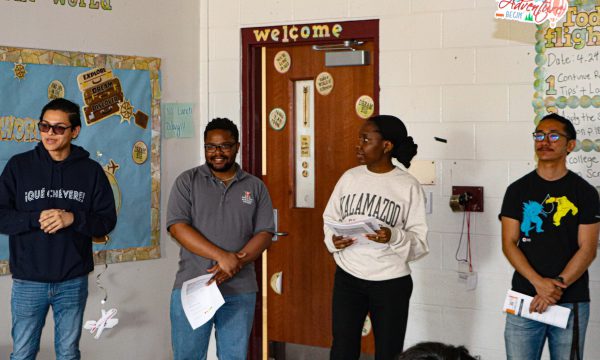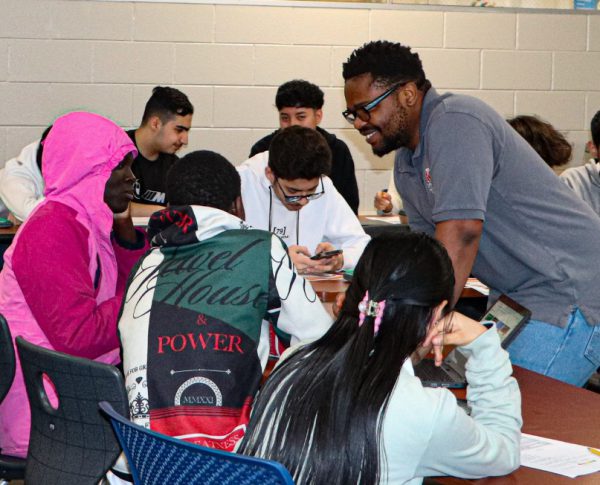Kalamazoo College international student Mphumelelo Khaba ’25 wants to tell area high school students from global locales that college turned out to be so much more for him than he originally dreamed it would be. As a result, the possibilities for them can be endless, too.
Khaba is from Eswatini in southern Africa and serves the Kalamazoo Language and Intercultural Partners (KLIP) program as a teaching assistant guiding three K courses—Language and Identity in Newcomer Classrooms, Language Acquisition, and Teaching for a Lifetime—with Learning Support Specialist Candace Combs. These courses are community-based learning programs offered in cooperation with the Mary Jane Underwood Stryker Center for Civic Engagement (CCE).
KLIP is a unique program in that it is facilitated through these courses and is also a student-led program supported by the CCE. Community-based classes unite community members, faculty and students in work related to education, health equity and access, immigration and borders, courts and criminal justice, sustainability and food justice, urban planning, transportation, reproductive rights, voting, housing, public art and more. K students in Khaba’s classes build connections between class content and work to welcome international newcomers to Kalamazoo and its public schools by applying knowledge and experience toward interactive activities, lesson plans, language learning games and structured reflection. Each course explores identity, shared experiences and community-based knowledge-building.
Khaba took his expertise in documentary filmmaking, picked up through courses led by Visiting Instructor Danny Kim, and decided to create What College Means to Me on KLIP’s behalf after proposing the project to Combs for his classes.
“With the way Danny teaches his classes, filmmaking is about more than the skills and techniques behind documentaries,” Khaba said. “It has life lessons embedded in it. For example, when I think about what it takes to create a documentary, you need to plan, schedule, make sure you have a lot figured out, and then contact people, trying to think about who could be a good fit for it. It’s about initiating, being proactive, talking, asking and explaining what you’re trying to do.”
International students Allan Martinez ’25, Senchen Subba ’25 and Akinyi Okero ’25 are featured in What College Means to Me along with alumna Julie Zabik ’20 and men’s tennis coach Mark Riley, who adds perspective on college athletics. The students featured in the film were eager to share how they had a dream and made it happen through hard work, a bit of luck, and a lot of support from their families. In a tour of Kalamazoo Central, Loy Norrix and Phoenix high schools, Khaba and the three current students showed newcomers the film they created to communicate some of the benefits of college and its experiences, including friendships, athletics, confidence building, study abroad and research projects, while going over details such as affordability, personal growth and education as an investment. Their goal was to help high school students relate to the idea that college starts with a dream.
The documentary is not a personal assignment or Senior Integrated Project, so “I would call it a passion project,” Khaba said. “I do a lot of things to fulfill what is meaningful for me and this is one of them. I think I would have enjoyed seeing something like it before college, so I wanted to create it for other people.”
In coming up with the title, Khaba was thinking how K has changed his life. The film doesn’t intend to recruit high school students specifically to K, but to show what college can help them do.


“I took some time to reflect and compare what I thought college was versus what it is to me now,” he said. “I could have taken a few other opportunities and pursued a few more interests, but where I come from, we’re told that college is just academics. I don’t think that anymore, so I came up with this documentary.”
Khaba admits he’s a big critic of his own work and usually thinks of something he would’ve done differently when his projects are done. Regardless, “I think the high school students received it well, especially with meeting the people involved with the film,” he said. “The discussions were productive and impactful because the film’s stories could clarify ideas. The mixture between the film and the discussion provided an impact that probably inspired a few students to think about college. The students we visited were inquisitive and curious how they could get to college themselves.”
Combs appreciates Khaba’s efforts, which will have a lasting impact on KLIP and international students in Kalamazoo.
“This documentary is Lelo’s third film on KLIP’s behalf in partnership with Kalamazoo Public Schools and under the guidance of Wessam Abdelaziz, the district’s coordinator of multilingual services and world languages,” Combs said. “Each film has been used to introduce and demonstrate our work with newcomer families and our dedicated partnership with the Kalamazoo Public Schools. In support of the college-going values of KPS, this film will continue to be used to inspire and motivate students to envision their potential and reveal the possibilities of a future in college.”
The experience will now serve Khaba well with his next project: a film that wraps up his experiences at K and what seniors will remember of their time at the College.
“I think I’ll enjoy this (new) film when I’m 40, when I’m 60 and for years after,” Khaba said. “I think this college imparted some excellent lessons and helped me see life more broadly. When you come from a specific culture, it can give you a tunnel vision into life. I think Kalamazoo College helped me see more and be more empathetic to re-evaluate my values and think critically about them. I’ve heard a lot about other colleges, but when I reflect on what I’ve had here, I’m always grateful. It’s been a fun experience.”
